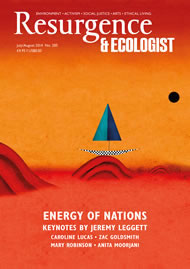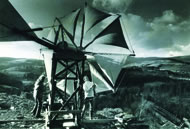The birth of alternative technology in the early 1970s signalled a remarkable shift in humanity’s relationship with science and technology. Before that shift, science and technology were predominantly associated with progress – everything would be better, faster and shinier. Like all scientists, nuclear scientists were heroes. Britain was revelling in the swinging sixties, and few people were watching out for the problems, let alone looking for the solutions.
However, as the sixties rolled into the seventies, events across the globe triggered some hard questions around the limits to growth, damage to Nature, and the depletion of resources. When the phrase ‘alternative technology’ was coined by Peter Harper in 1972, it was not simply a collective noun for solar panels, windmills and compost bins, but rather a conceptual framework to underpin them – challenging corporate control and making technology accessible to citizens, communities and nations.
Inspired by these ideas, in November 1973 Gerard Morgan-Grenville signed a lease on a disused slate quarry in mid Wales to begin The Village of the Future: powered by renewable energy, fed with organic produce and run under cooperative principles. The following spring, the first wave of young idealists arrived, inspired by the notion of building a living, working community to test these emerging alternatives, to find out which ones worked and which ones didn’t. In harsh conditions, they set about befriending the quarry, rebuilding the derelict houses and machine sheds and pickaxing paths through the piles of broken slate. It was a hard life, and only those with immense fortitude stayed longer than a few weeks.
Many of the arriving pioneers were engineers and scientists who immediately recognised the vital importance of ‘doing the numbers’. As with many new concepts, willing supporters all too easily credited alternative technology with magical powers that offered all sorts of benefits! However, a rigorous approach paid off and the Centre began to successfully challenge conventional practice in energy and land use, pioneering innovative new technologies and spawning like-minded projects across the globe.
To make this fascinating story more widely available, BBC’s Sue MacGregor recently pulled together several of the early pioneers for Radio 4’s The Reunion, a programme that remains available via the BBC website. An oral history project has interviewed over 80 staff, trustees, members and local residents, and many of the original research papers, diaries, photos, film and mementos are being archived in the National Library of Wales. The Centre for Alternative Technology (CAT) has engaged five artists-in-residence to create visual work around the theme ‘Voices from a Disused Quarry’.
Over four decades CAT has inspired, informed and enabled hundreds of thousands of people, hugely impacting on environmental thinking and practice. In 2010, with the opening of the ambitious Wales Institute for Sustainable Education (WISE) training facility, CAT renewed its focus on providing “new skills for a new future”. A 200-seat circular lecture theatre was built from rammed earth, while hemp and lime were used for classrooms, laboratories, workshops and study-bedrooms.
Specialising in experiential learning, CAT’s ‘living laboratory’ allows people to eat, breathe and sleep green living. A water-powered cliff railway carries 30,000 people a year up the 180ft slope. Experts with many years’ practical experience offer an annual programme for schools and colleges, up to postgraduate level. The teaching is complemented by sustainability in practice – by the food they eat, the beauty and comfort of green classrooms, and the way electricity is generated and water managed. In this immersive environment, people learn not just with their heads, but also with their hearts and their whole beings.
Significant anniversaries like this offer a useful chance to take the long view and see what we have learnt, as we plan the way ahead. Perhaps first and foremost is the importance of remaining flexible while ideas are evolving. CAT quickly learned that focusing on self-sufficiency and living off-grid was not going to deliver change on the scale and speed required. Therefore conscious decisions were made to develop a more system-based approach, which now manifests in work such as Zero Carbon Britain. CAT also recognised that “failure is the compost of success”. It is far better to try brave experiments and learn from your failures than to stick to stuff you already know works.
Looking back, we see the incredible story of how a small group of inspired individuals took a fringe cause and drove it to the heart of political debate and social acceptance. But although change is happening, we now know that our political, industrial and civic leaders have failed to grasp the scale and urgency of the transition demanded by the science – we now need a cultural shift.
In these past 40 years the alternative movement has demonstrated how collective creativity can break through prejudice, apathy and blind spots to radically transform attitudes to gender, race, religion and class. And once a cultural shift is catalysed, the legal, political and administrative frameworks will invariably follow.
CAT has also recognised that our changing planet means we must embrace adaptation; however, a knee-jerk approach could easily make things worse. For example, in flood protection, miles of concrete river walls will drive up emissions, whereas planting trees further upstream can deliver a similar adaptation effect whilst actually locking away carbon. We must seize this opportunity to adapt in a way that also transforms our relationship to the natural world, respecting its limits and fostering its health. This work will form a key part of the next chapter in CAT’s story. Over the coming years, CAT’s new ‘Changing Planet’ programme will help accelerate this shift by providing more postgraduate students going into key positions across society, more inspired, informed and enabled visitors, more CAT members active in their communities and workplaces, and more young people gathering sustainable skills.







